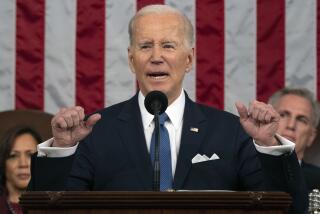As Biden and Republicans meet, Democrats prepare to move on COVID relief alone

- Share via
WASHINGTON — As President Biden met with 10 Republican senators Monday to test the waters of bipartisanship on coronavirus relief, Democrats on Capitol Hill took the first step toward fast-tracking the administration’s $1.9-trillion proposal through a legislative procedure that wouldn’t require GOP support.
Although the Oval Office meeting, Biden’s first with lawmakers, appeared cordial, it may amount to a token demonstration by both sides — an opportunity to hear each other out rather than a negotiation to bridge the massive gulf between them.
A group of 10 moderate GOP lawmakers put forth its counterproposal Sunday, outlining a $618-billion measure that would include more limited direct relief targeted to the neediest individuals, an extension of unemployment benefits through June (under Biden’s plan, it would be extended through September) and funding for vaccine distribution, school reopenings and small-business loans, albeit in smaller amounts.
Emerging from the West Wing on Monday evening after a longer-than-expected two-hour conversation, the group’s leader, Sen. Susan Collins (R-Maine), expressed appreciation that Biden “chose to spend so much time with us” and called the meeting “excellent,” declining to offer details — or criticism — even as she acknowledged the impasse.
“I wouldn’t say we came together on a package tonight. No one expected that, but what we did agree to do is to follow up and talk further,” said Collins, the only Republican to address reporters outside the White House, before her group departed without responding to questions.
While Biden has vowed to lower the temperature in Washington and restore a greater degree of bipartisanship, he has argued in recent days that the GOP’s scaled-down proposal — one-third the size of the administration’s package — would be grossly inadequate. Confident that his policy goals align with the politics, the president appeared determined to push ahead with his American Rescue Plan, which would deliver more relief to more Americans and, unlike the Republican plan, includes funding for state and local governments and an increase of the federal minimum wage to $15 an hour.
“While there were areas of agreement, the president also reiterated his view that Congress must respond boldly and urgently, and noted many areas which the Republican senators’ proposal does not address,” said Jen Psaki, the White House press secretary, in a statement released after the meeting. Biden, she continued, told GOP lawmakers that “while he is hopeful that the rescue plan can pass with bipartisan support, a reconciliation package is a path to achieve that end. The president also made clear that the American Rescue Plan was carefully designed to meet the stakes of this moment, and any changes in it cannot leave the nation short of its pressing needs.”
In theory, the support of 10 Republicans would give Biden and Democrats 60 votes to overcome a filibuster and pass the legislation without having to resort to budget reconciliation, a maneuver that would enable the Democratic Senate majority to jam through much of the larger package with just 51 votes.
But Democrats appear committed to moving ahead with the larger package, determined to act with urgency and on a scale that is sufficient to overcome the multifaceted crisis, which continues to imperil public health and the economy.
Hours ahead of Biden’s meeting with Republicans, House Speaker Nancy Pelosi (D-San Francisco) and Senate Majority Leader Charles E. Schumer (D-N.Y.) filed a joint budget resolution, a legislative tool that opens the door to passing Biden’s $1.9-trillion American Rescue Plan using reconciliation.
With an evenly divided Senate, the move would allow Democrats to move forward without support from Republicans.
“The smartest thing we can do is act big, according to Treasury Secretary Yellen. So, that is what the Senate is going to do — act big,” Schumer said on the Senate floor Monday.
Although the process lets Democrats skirt Republicans on COVID relief if needed, Schumer stressed that “there is nothing in this process that would preclude it from being bipartisan.”
Republicans, who have been frustrated that the administration put its package together without their input, are looking to pressure Biden by pointing to his rhetoric about wanting to return Washington to a less hostile place where bipartisanship is once again possible.
“We recognize your calls for unity and want to work in good faith with your Administration to meet the health, economic, and societal challenges of the COVID crisis,” states the letter, orchestrated by Collins. The other signers are: Rob Portman of Ohio, Bill Cassidy of Louisiana, Lisa Murkowski of Alaska, Mitt Romney of Utah, Shelley Moore Capito of West Virginia, Todd Young of Indiana, Jerry Moran of Kansas, Mike Rounds of South Dakota and Thom Tillis of North Carolina.
Nine of the 10 attended Monday’s meeting in person; only Rounds, who called in, was physically absent.
Biden has signaled an openness to at least one component of the GOP’s proposal, limiting direct relief to low- and middle-income individuals.
The GOP proposal calls for checks of up to $1,000 for individuals making $50,000 a year or less and families with a combined income of up to $100,000. Only individuals making less than $40,000 — and families earning less than $80,000 — would receive the full amount of $1,400.
The GOP package would also include $160 billion for vaccine distribution and development, coronavirus testing and the production of personal protective equipment; $20 billion aimed at helping schools reopen; more relief for small businesses; and additional aid to individuals. Unemployment benefits at $300 a week — currently slated to lapse in March — would also be extended through June 30.
But the president and an administration staffed with veterans of the Obama era’s congressional battles are loath to allow the GOP’s promises of their possible support to slow or dictate their response. Moreover, the White House is confident its plan is broadly popular and more likely to be effective than a scaled-down version, pointing to support from more conservative economists and groups, including Kevin Hassett, President Trump’s former economic advisor, and the Chamber of Commerce.
A Monmouth poll showed a majority of Americans — 61% — supporting Biden’s initial policy proposals. And respondents seemed to put the onus on Republicans to work with the new president. According to the survey, 71% of Americans prefer to see the GOP find ways to work with Biden as opposed to just 25% who want Republicans to focus on keeping him in check.
Times staff writer Sarah D. Wire contributed to this report.
More to Read
Get the L.A. Times Politics newsletter
Deeply reported insights into legislation, politics and policy from Sacramento, Washington and beyond. In your inbox twice per week.
You may occasionally receive promotional content from the Los Angeles Times.











